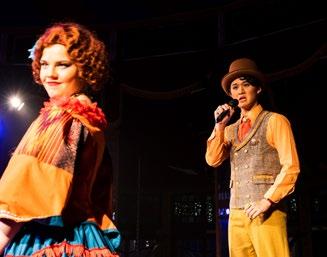
4 minute read
Senior School Production

The Threepenny Opera
The Threepenny Opera was premiered in 1928 by Brecht’s Berliner Ensemble with the help of his essential collaborator Elisabeth Hauptmann. However, it is really Kurt Weill’s score that keeps the piece alive today; perpetually jerky, slippery, and unpredictable. Just as you start to hum along with a tune, it heads off in a totally different direction.
The Famous Spiegeltent is the most beautiful of the few remaining Belgian Spiegeltents, built in 1920 it has travelled the world. Since Marlene Dietrich sang Falling in Love Again on its self-same stage in the 1930s, it has travelled the world to end up here at Camberwell Grammar. Just like The Threepenny Opera itself, the tent is no dusty museum piece but a vibrant and contemporary experience, and Mr Andrew Stocker’s marriage of venue and performance was a match made in heaven. The smell of teak, the drape of luxurious fabric, and the sparkle of reflected light from the mirrors created a magical space. As the lights dimmed, the overture by Mr Ben Bishops’ The Threepenny Band, ably co-directed by Darby Lee, foreshadowed what was to come with an ominous thrumming. The ensemble burst through the surrounding audience, and the Balladeers, with yellow checked trousers, red tailcoats, and top hats boldly proclaiming, ‘This is the Threepenny opera’. This was clearly not going to be dull Agitprop theatre!
There are no secrets hidden from the audience. Brecht suggested placards bookending each scene. Here, a jaunty disembodied hand scribes for us what is to come in each scene with an emphatic full stop, introducing the characters and action. Fletcher Von Arx was an extraordinary Macheath, the master criminal undone by his sexual voracity. Every scene was played with enormous relish and obvious delight as he veered from barely disguised violence to indulgent lecherousness. ‘In this world, ladies and gentlemen, only those with cash are truly free,’ he tells us. Colin Jiang was truly a Peachum for our times; a forceful iron fist in a dandyish, foppish glove with bouffant hair and extravagant make-up, a ‘perfumed ponce’ as he is later described. Lexie Smith was outstanding as his lecherous wife Mrs Peachum, whose ‘Ballad of Lust and Desire’ was delivered with gusto and pathos. Tragic Jenny, Emmanuelle D’Adamo, a broken figure, and Annabel Nelson were the embattled rivals for Macheath’s affections. Polly’s wistful ‘Barbara Song’ was very Brechtian in tone, ‘I perform, and you’re sitting there as scum’; Annabel has a gorgeous voice and performed with great poise and nuanced delivery.
The action starts with Charlie Filcher ‘the unluckiest soul in the world’, played with suitable pathos by Jade Bishop, looking for an opening. Survival in a corrupt world, Peacham teaches him, requires compromise, ‘we can’t have ethics that we can’t afford.’ We are shown the four types of the basic beggar, Ned Chesler was quite convincingly crazy as an escapee from a lunatic asylum!
Mack’s gang was indeed a very dodgy collection of assorted rogues; Jonty Neil was consistently off-putting as Walter, ‘posh boy’ Robert was played with flash pomposity by






Cooper Carbone, and Andy Bishop, Thomas Newman, Hugh Cran, Connor Inston, and Zaid Imran all admirably supported with clear Brechtian archetypes. Special mention surely to William Allsop’s ‘cockingly’ guileless Officer Smith. Tiger Brown, Limehouse’s own Superintendent, is one of Mack’s oldest foes, the arbiter of justice, and is played dourly and humourlessly by Harry Watson.
True to Epic Theatre, we are all made complicit in the action as Peachum addresses the audience, urging us to be ‘patriots’ reminiscent of recent events in the US. Despite his shocking behaviour, Macheath chastises us and warns us not to judge him as Balladeers appear with a message from the King. ‘We want you to leave happy’ they say ‘look who’s here!’ as Tommy Auwardt enters as a foppish, camp King who not only forgives but provides a substantial salary for the terrible Mack The Knife. (You must wonder what was written in that pink envelope.)





Mrs Jennifer Bennie’s wardrobe had nods to the excesses of the 1980s, the Weimar Republic, the unnerving makeup of Kubrick’s A Clockwork Orange, and even Victorian dandies and was perfectly complemented by Martina Lindsey’s makeup and Kerrin Barker’s hair styling. Miss Miranda McDonald’s choreography of ‘The Pimps Ballet’ was a testament to her skill, using the whole cast in a restricted space ‘in-the-round’ but allowing clear views and something interesting for everybody.
Mr Andrew Stocker’s direction was exactly as Brecht and Weill wanted; a night at the theatre should not be like immersing yourself in a warm relaxing bath but should keep you constantly alert and questioning what is happening in front of you. As Mack himself remarks, ‘There was nothing beautiful about that, it was art.’
Mr Jason Hall
French and Drama Teacher











